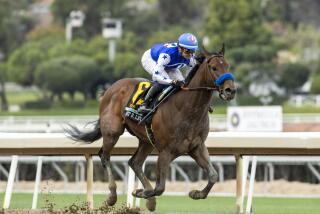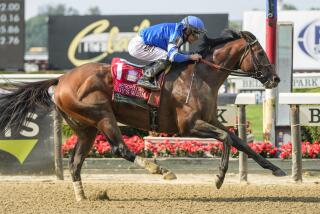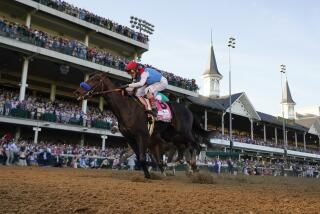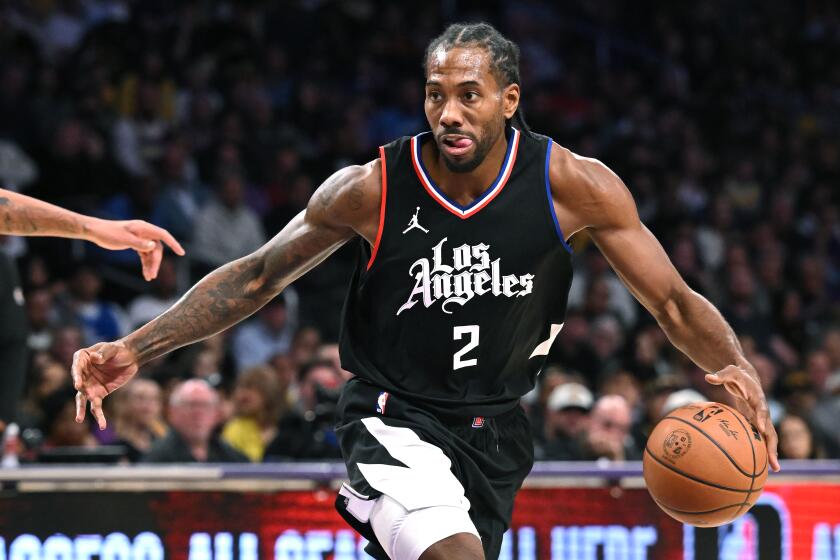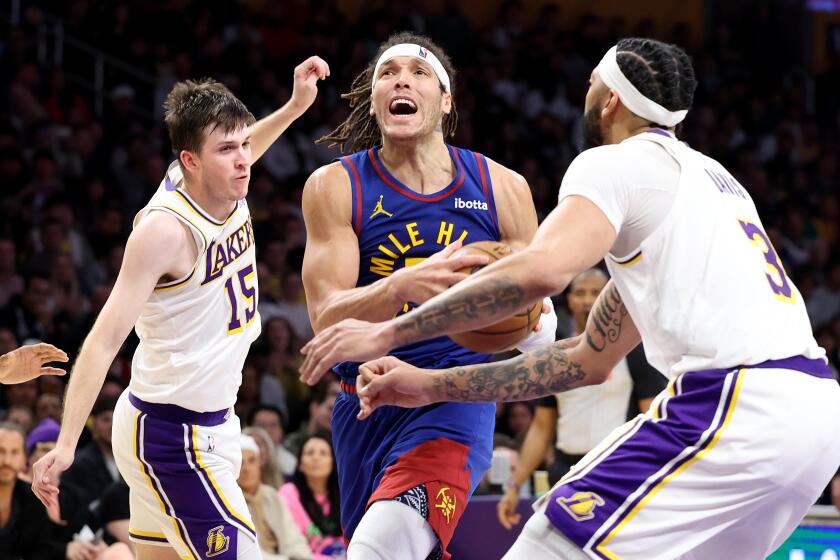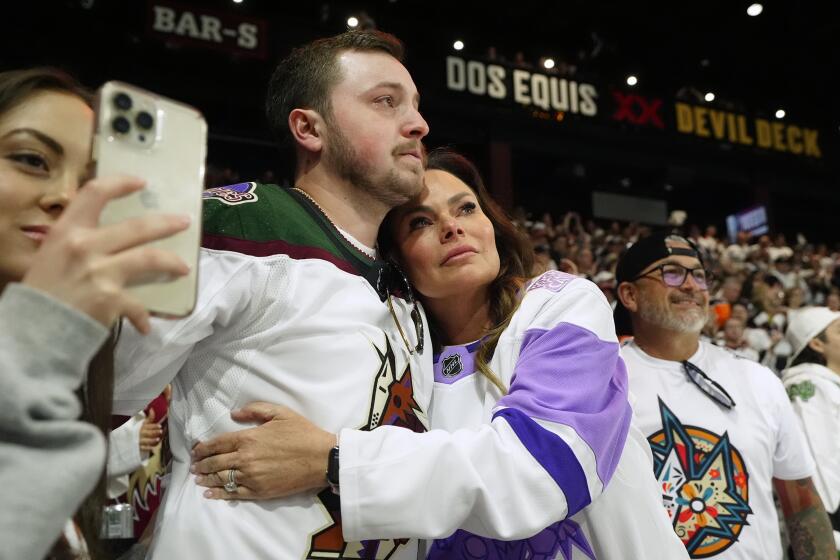Out of ‘Luck,’ Gary Stevens gets back in the saddle
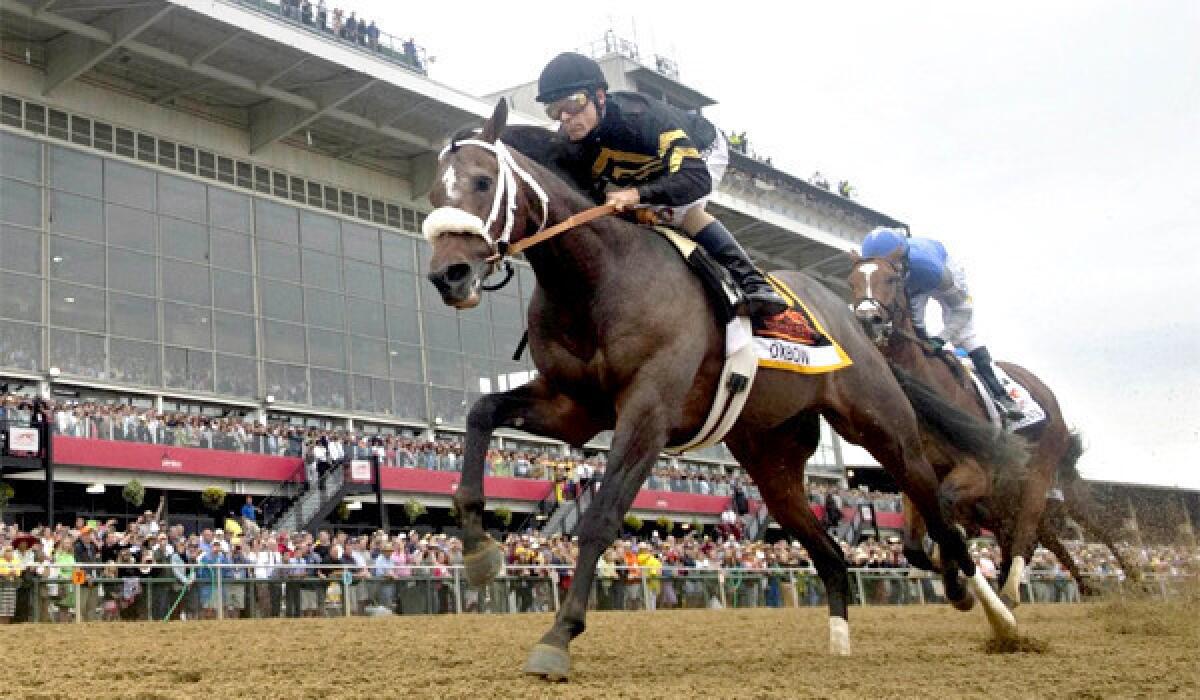
The comeback of Gary Stevens was never intended for a real Triple Crown race aboard a horse named Oxbow.
No preconceived game plan put him in the winner’s circle at the Preakness last month, much less on his way to Saturday’s Belmont Stakes.
Stevens’ comeback was supposed to be fictional, made for TV, on an HBO series called “Luck.”
His redemption was coming through his portrayal of Ronnie Jenkins, the Jack Daniels-drinking jockey character executive producer David Milch based on Stevens, who retired in 2005 after a Hall of Fame career.
“He made it even darker than what I am,” Stevens recently joked. “I think. I hope. Not much, maybe.”
Stevens proved he could act a decade ago in the hit movie “Seabiscuit.”
He didn’t have to stretch much, though, to play Jenkins. “He had a lot of demons, a dark side to him,” Stevens said of his character on HBO’s horse racing drama. “I sort of became that guy.”
Stevens was looking forward to Season 2. “He was going to a good place,” he said of Jenkins, “a really good place.”
But HBO abruptly canceled “Luck” last year after three horses died. Stevens, without Jenkins as a vehicle, was lost.
“Subconsciously, I felt there was unfinished business, for him and for me,” Stevens said.
Stevens’ only choice was to finish the story in real life.
His spiral after “Luck” reached the point where his wife, Angie, almost chased him back into the saddle.
It was one thing when her husband, rounding the turn toward age 50, hopped on his first mount in seven years in January.
Stevens stunned everyone, though, four months later when he rode Oxbow to a surprising Preakness upset over Kentucky Derby winner Orb.
Stevens became the oldest Preakness winner as he notched his ninth win in a Triple Crown race.
The undercurrent leading to the “pinch-me” part was Stevens’ needing something to save him. He was depressed, drinking too much and couldn’t find enough adrenaline fixes on a golf course.
“I felt like I was more for it than he was,” Angie said of her husband’s comeback. “I was living with a monster.... Not a monster. But he was miserable.”
Stevens complained often to Angie that he still had the stuff to be a top jockey. He had won nearly 5,000 races, ridden Kentucky Derby, Breeders’ Cup and Santa Anita Derby winners.
Angie finally said to him “Why are you sitting here talking about this?”
So Stevens quit talking.
The big issue was the surgically scarred right knee that impaired his riding ability and forced him into retirement. “I didn’t feel the owners and fans were getting the Gary Stevens they get when he was at his best,” he said. “It wasn’t fair to them.”
Jockeys take an enormous pounding. Some body parts last longer than others.
During a recent lunch at his favorite Sierra Madre pub, Stevens reviewed his medical chart. “Three scopes on the left knee,” he said. “There are still six screws in my right wrist. Two shoulder reconstructions.”
Right knee?
“Eleven surgeries: One major, 10 scopes.”
Stevens rolled up his pant leg to reveal a clump of walnuts held together by a piece of medical tape — at least that’s what it looked like.
“If I was a claiming horse, you wouldn’t buy me,” he said.
Angie thinks the knee looks more like “a big knob on a tree.”
Anyway you viewed it, the knee was trashed.
“It’s the one you ride higher in the irons,” explained veteran jockey Mike Smith, one of Stevens’ best friends. “It takes more pressure than the other.”
Stevens never worked out in his prime. He just rode. The comeback required a full commitment to fitness. He hired a nutritionist and sports psychologist. A physical therapist in Seattle, Clark Masterson, worked with Stevens to strengthen the muscles around his right knee. He lost 25 pounds and 8% of his body fat.
It worked. He jumped back in the saddle early this year, in a $50,000 claiming race and finished third aboard a longshot named Jebrica.
After he retired to become an analyst for NBC and HRTV, Stevens says, he quit going in the jockey’s room: “I didn’t feel like I was one of them anymore.”
Suddenly, as a rider again, he was back home in his inner sanctum, the place where he hid out during the depths of an earlier divorce. “I was back in my domain,” he said. “I felt like I owned it again.”
So then, of course, almost like a movie, longtime trainer and partner D. Wayne Lukas called to say he had a horse for Stevens to ride.
“I couldn’t believe it,” Stevens said. “I thought, ‘Here we go again.’ ”
It was the Lukas team that, years ago, put a young jockey on a horse named Winning Colors.
“Let’s ride the kid from Idaho,” Lukas said of Stevens, born in Caldwell.
Winning Colors won the 1988 Kentucky Derby.
Lukas and Stevens, now on life’s backstretch, are teamed up again.
The 77-year-old Lukas was down on his luck too, referred to by one prodder in the press as “Dead Duck Darnell,” a reference to Lukas’ first initial. Lukas had won 13 Triple Crown races, but this year’s Preakness was his first win since 2000.
The horse Lukas had lined up was Oxbow.
“I felt strongly about not putting him on just a horse,” Lukas said.
Stevens turned 50 in March but says he feels better than he did when he turned 30.
Stevens and Lukas still spar like an old married couple. Lukas was less than thrilled with Stevens’ fifth-place limp-home on Oxbow at the Arkansas Derby. That was the race Lukas said Stevens “won’t show to his grandchildren.”
Stevens had a better ride at the Kentucky Derby, finishing sixth, before knocking the saddle off Orb at the Preakness.
Stevens says every jockey yearns for the sport’s first Triple Crown winner since Affirmed (1978), unless he can be the rider to deny it.
“Lukas had one of the greatest quotes I’ve seen,” Stevens said. “He said, ‘I get paid to spoil people’s dreams.’ And he hires me to help him. And it’s true.”
The Preakness lifted Stevens to a different appreciation stratosphere. It was like George Foreman coming out of mothballs to win the heavyweight title again.
“I don’t think it’s different than any other athlete,” Stevens said. “You never want it to end. You don’t realize how good things are, how sweet you got it, and then it’s gone.”
Hot-headed at times in his heyday, Steven is suddenly beloved. He said his phone literally “blew up” from data overload after his win at Pimlico. He is basking in the unexpected success with four grown children from his first marriage and with Maddie, Gary and Angie’s 4-year-old daughter.
The demons in Stevens’ head have been chased to the outer recesses.
He has taken the whip to Father Time.
Everyone knows the knee is a ticking bomb and needs to spend more time around ice than an Eskimo. Stevens nurses it morning and night, and especially after long conditioning walks up the Mt. Wilson trail.
“I learned to play hurt a long time ago. I’m just saying I’m riding with less pain than I’ve had since I was in my 20s,” he said.
Stevens has reduced his riding load, but there is always peril at every turn. He took a spill in last Saturday’s seventh race at Hollywood Park but escaped relatively unscathed (hospital X-rays on his ribs were negative).
The party now moves on to the Belmont, the longest leg of the Triple Crown and Stevens’ favorite race to ride.
“If you look at from the outside looking in, it’s phenomenal what he’s doing at age 50,” Smith, his jockey friend, said. “Knowing him as I do, it doesn’t surprise me one bit. He was born to do this.”
Stevens doesn’t want the carousel to stop, but you don’t tell horse racing when you want to stop — it tells you.
And if the knee blew out tomorrow?
“I won’t say I wouldn’t care, because I would care,” he said. “I’m loving what I’m doing right now. But if it was taken away from me tomorrow, I’d be all right.”
Life is strange.
Stevens was crushed when “Luck” was canceled. He was going to lean on acting in his AARP years.
Had “Luck” survived, though, there would have been no racing comeback.
“It’s the reason I’m back riding,” Stevens said. “If they didn’t cancel it, I wouldn’t be sitting here right now.”
Stevens won wide acclaim for his role as jockey George Woolf in “Seabiscuit.”
Some wonder who might play Stevens in his movie.
“Not me,” Stevens said.
Lukas says the story’s not over yet.
“If we pull this one off Saturday I don’t know where this will go,” he said. “We have great karma together. We’ll continue through the summer. I’ve got some awfully good 2-year-olds. I think we’re not done.”
In the 1980s, famed sports surgeon Dr. Robert Kerlan had to inject Stevens’ right knee to get him through a racing card.
Kerlan would ask: “Do you have any idea what this knee is going to look like when you’re 40?”
Stevens would say: “I need to ride the weekend.”
How about riding a weekend at age 50?
“I tell people I’m running on retreads right now,” Stevens said. “You can be going down the freeway at 70 mph and all of a sudden you’ve got the rubber off on the side of the road. And that’s me. And I can accept that. I don’t know when the rubber’s coming off. But I’m cruising about 70 right now.”
More to Read
Get our high school sports newsletter
Prep Rally is devoted to the SoCal high school sports experience, bringing you scores, stories and a behind-the-scenes look at what makes prep sports so popular.
You may occasionally receive promotional content from the Los Angeles Times.
